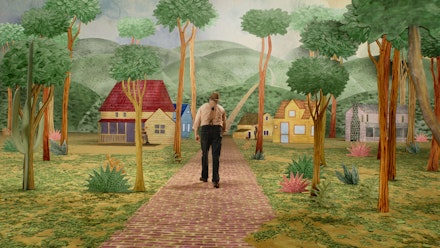Ari Aster’s increasingly wild filmography seems to all hinge on one simple, unifying theme: fucked-up families. In his head-lopping horror Hereditary, Toni Collette bluntly informs her son that she “tried to have a miscarriage”. In the sunny folk horror Midsommar, Florence Pugh’s family is dead from a murder-suicide within the first five minutes. In Beau Is Afraid, the dysfunctional relationship between paranoiac middle-aged loser Beau (Joaquin Phoenix, obviously exceptional) and his distant, controlling, enigmatic mother (a gift of a role shared by Patti Lupone and Zoe Lister-Jones) forms the backbone of the deceptively straightforward story. In the most basic terms, the plot is essentially “A man pops to his mum’s house”.

The journey between those two points, however, plays like ‘Murphy’s Law: The Movie’: anything that can go wrong for Beau probably will, depicted with neck-snapping gallows humour and some astonishingly well-staged set-pieces, Aster’s camera moving at a frantic lick to reflect his protagonist’s unquiet mind. Not since Darren Aronofsky’s mother! — a film which, incidentally, also trades in metaphorical-mythical mommy issues — has anxiety been depicted so viscerally, Freudian inadequacy taken to staggering extremes. In this permanently heightened reality, Beau’s irrational anxieties are in fact entirely rational, all his darkest fears being realised seemingly at once.

In the film’s first half in particular, there is a morbid pleasure in just watching the chaos unfold. Beau lives in a godawful apartment building covered in graffiti (choice tag: “Kill Children”) above a porno cinema named Erectus Ejectus. He must sprint to his front door in order to avoid the vagrants, ne’er-do-wells, and the naked man with a penchant for stabbing. The opening section is like The Warriors crossed with a Hieronymus Bosch painting, a descent into a bizarre, bewildering Ballardian hell.
By the time the final act rolls around, reality seems an entirely relative concept.
In the film’s latter half — after having befriended a seemingly well-meaning couple, played by Amy Ryan and Nathan Lane, who cheerfully attach an electronic ankle tag to Beau — our hapless hero heads into the woods, and the film seems to get a little lost in it, too; in a story with an already tenuous grasp on reality, a parallel story opens up, an apparent fantasy told with theatrical and animation trappings.
By the time the final act rolls around — with its revelations of an elaborate Oedipal conspiracy theory, some gestures towards the metaphysical, and perhaps the most monstrous dick joke in cinema history — reality seems an entirely relative concept. What began as a comically exaggerated paranoid farce ends as an audacious slice of surreal, Charlie Kaufman-esque purgatorial art, likely to draw admirers as much as a sense of alienation.
After making a certain amount of narrative sense to begin with, Aster doesn’t really take you along the rest of the way. But that seems to be the point, if there is one: a nightmare is not supposed to end satisfyingly or comfortably. It should only end bewilderingly and abruptly, leaving you blinking and agape in the morning light, wondering what in God’s name just happened.






